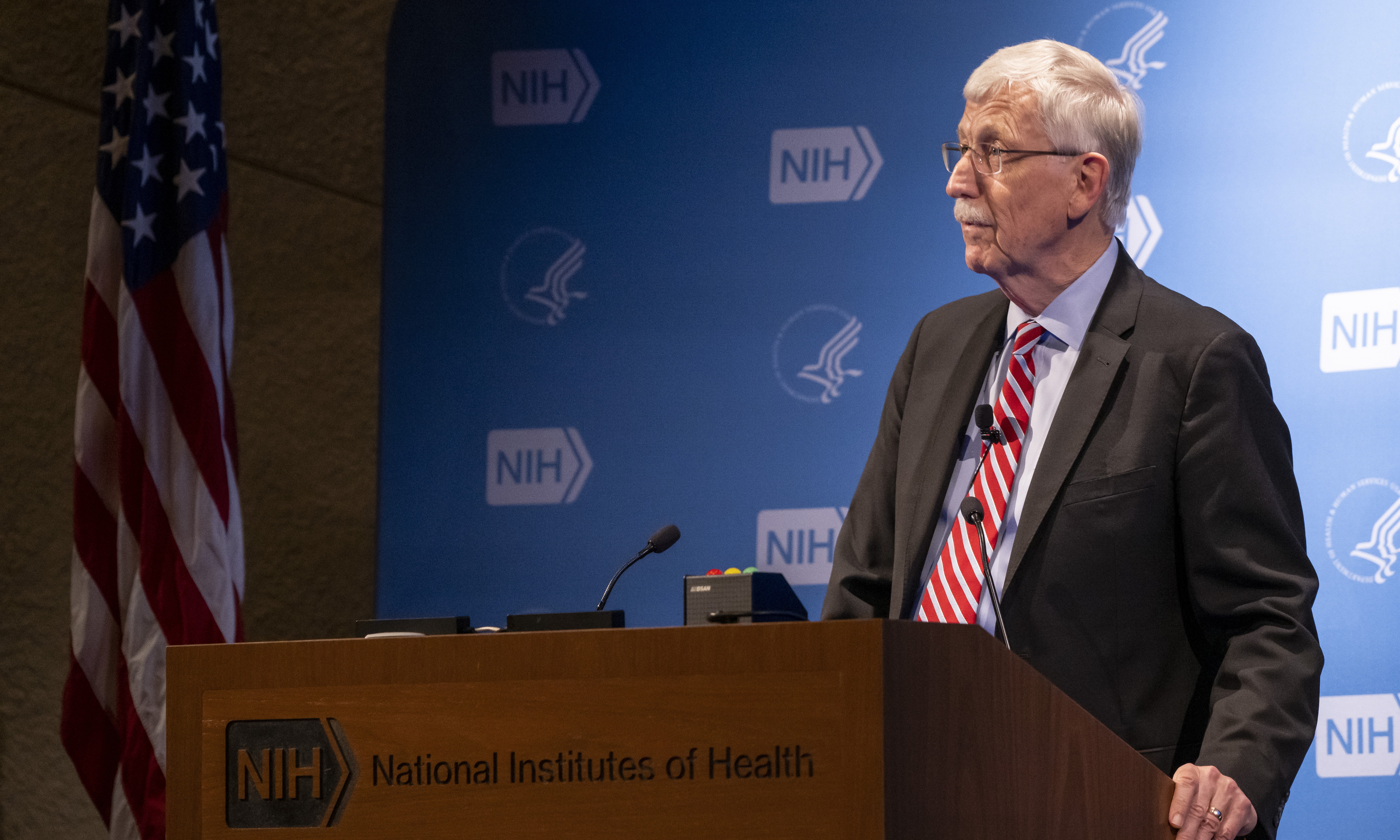Dr. Francis Collins on 70 years of Clinical Center research
In a Grand Rounds address, the former NIH director celebrated the center’s 70th anniversary, highlighting groundbreaking research and future challenges

Dr. Francis Collins speaking during a Grand Rounds lecture.
Pioneering researcher and former NIH Director Dr. Francis Collins addressed the Clinical Center community in a recent Grand Rounds talk in honor of the center’s 70th anniversary.
During his June 28 presentation, entitled “Seven Decades at the Forefront of Medical Research: The NIH Clinical Center,” the physician–geneticist surveyed the Center’s history of groundbreaking research and shared his insights into its future challenges and opportunities.
In his retrospective, Collins celebrated a long list of major Clinical Center research advances, which transformed the understanding and treatment of cancer, sickle cell anemia, infectious diseases such as HIV and Ebola, vaccines, mental illness, and rare diseases.
The first cure of a solid cancer tumor with a chemotherapy drug, the first approved human gene therapy, and the use of ketamine to treat severe depression and suicidality, were just some of the many milestones Collins cited. The Presidential Medal of Freedom recipient said he hoped his “romp” through 70 years of remarkable Clinical Center research left listeners in awe.
“To see this track record, this number of major advances that have really changed the course of medicine all coming from this Clinical Center … is pretty darn phenomenal,” he said. “There’s no place else on Earth that comes close to that kind of level of achievements.”
Collins noted, for example, the vision of Dr. Steve Rosenberg, senior investigator and chief of the NCI Surgery Branch, who joined the Clinical Center in 1974 and embarked on a decades-long quest to discover how to activate the immune system to fight cancer.
“I think Steve would tell you this is the kind of facility that made it possible over this stretch of time, with many high-risk … protocols that did not succeed, to keep pushing forward those boundaries,” Collins said. “[That] might have been very difficult to do in any other place and now [his research] has unleashed an entire field of cancer immunotherapy.”
Collins used the second half of his presentation to spotlight the key opportunities and challenges that he believes the Clinical Center will face in the years ahead. “We’re in this exponential phase of progress in biomedical research, much of it driven by technology,” he said.
The physician-geneticist highlighted the importance of cell therapy, gene therapy, vaccine research, Alzheimer’s research, and precision medicine and emphasized the need to maintain cutting-edge facilities, focus on patient safety, and support the NIH-wide UNITE initiative to address structural racism in biomedical research.
He also shared his hope that the Clinical Center can grow its capacity to treat pediatric patients younger than two years old, particularly when it comes to gene therapies.
Reflecting on the Clinical Center’s role as a “House of Hope” for patients who serve as fellow partners in research, Collins said, “The people that we are most grateful to are the patients, who have come here and put their trust in us.”
He expressed his optimism that the Clinical Center will continue to evolve in ways that will save many lives and reduce much suffering. “But it’s going to take every bit of energy and creativity and risk-taking that has characterized this Clinical Center from the very beginning back in 1953.”
Known for his landmark research into disease genes, Collins led the International Human Genome Project and later worked as NIH Director under three presidents, becoming the longest-serving director in modern NIH history. He currently serves as a senior researcher for the Center for Precision Health Research, where he investigates the role genes play in a range of human diseases with the aim of discovery new treatments.
— Sean Markey
Watch a video presentation of Dr. Francis Collins’s Grand Rounds lecture.